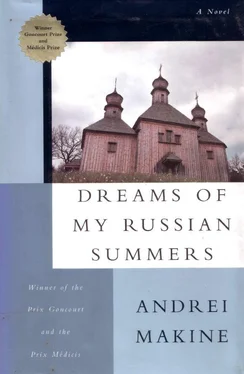Happy in my solitude, I put my plan into execution. I pulled out the Siberian suitcase onto the rug near the bed. The catches emitted that light clicking that we awaited each evening. I threw back the great lid and bent over those old papers like a pirate over the treasure in a chest…
At the top I recognized certain photos; I saw the tsar and tsarina again in front of the Panthéon, then on the banks of the Seine. No, what I was looking for was located farther down, in that compact mass blackened with printer's type. Like an archaeologist, I lifted up one layer after another. Nicholas and Alexandra appeared in places unknown to me. One more layer, and I lost sight of them. Then I saw long battleships on a slack sea, airplanes with ridiculous short wings, soldiers in trenches. In my attempt to locate a trace of the imperial couple, I was now digging at random, mixing up all the cuttings. For a moment the tsar came into view on horseback, an icon in his hands, in front of a row of kneeling foot soldiers… His face seemed aged, somber. But I wanted him to be young again, accompanied by the beautiful Alexandra, cheered by the crowds, celebrated in fervent verses.
It was right at the bottom of the suitcase that I came upon a clue at last. The headline in large letters – "Glory to Russia!" – left no room for doubt. I smoothed out the paper on my knees, as Charlotte used to do, and began softly to mouth the lines:
Great God, there is good news to tell!
With joyful hearts we greet the day,
To see collapse the citadel,
Where slaves once groaned their lives away!
To see a people's pride reborn,
The torch of justice raised on high!
To celebrate this happy morn,
Friends, let your flags and banners fly!
It was only when I reached the chorus that I paused, seized by a doubt: "Glory to Russia "? But what had become of that land, "blond with her corn, white with the white of snow"? That "country fair" whose soul was "rich and rare"? And what were these slaves doing here, groaning their lives away? And who was the tyrant whose downfall was being celebrated?
In confusion, I went on to recite the chorus:
All hail, Russia, all hail to you! People and soldiers together stand! All hail to you, all hail to you, Who now redeem your Fatherland! All hail the Duma's newfound power, Its sovereign voice will soon have spoken, For happiness now comes the hour, With all your chains forever broken.
Suddenly some headlines caught my eye, poised above the lines of verse:
Nicholas II Abdicates: Russia's 1789. Russia Finds Freedom. Kerensky – The Russian Danton. Peter and Paul Fortress – Russia's Bastille – Taken by Storm. Collapse of Autocracy…
Most of these words meant nothing to me. But I grasped the essential. Nicholas was no longer the tsar, and the news of his downfall had inspired an ecstatic explosion of joy among the people who, only yesterday, were cheering him and wishing him a long and prosperous reign. Indeed I had a very clear memory of Heredia's voice, which still echoed round our balcony:
It was thy father forged a bond that tied Russia to France, in brotherly hope allied. Hear now great Tsar, how France and Russia bless Thine own name, with thy patron's name, no less!
Such a reversal seemed to me inconceivable. I could not credit so base a betrayal. Especially on the part of a president of the Republic!
The front door banged. Hastily I gathered up all the papers, closed the suitcase, and pushed it under the bed.
At dusk, because of the rain, Charlotte lit her lamp indoors. We took our places beside her exactly as we used to in our evenings on the balcony. I listened to her story: Nicholas and Alexandra were in their box at the theater, applauding Le Cid. … I observed their faces with a disillusioned sadness. I was the one who had glimpsed the future. This knowledge weighed heavily on my child's heart.
"Where is the truth?" I wondered, as I followed the narrative distractedly. (The imperial pair stand up, the audience turn to give them an ovation.) "These same spectators will soon be cursing them. And nothing will remain of these few fairy-tale days! Nothing…"
The ending, which I was condemned to know in advance, suddenly seemed to me so absurd and so unjust, especially at the height of the celebration, amid all the bright lights of the Comédie Française, that I burst into tears, pushed aside my little stool, and fled to the kitchen. I had never wept so uncontrollably. Furiously I shrugged off my sister's hands when she tried to comfort me… (I so resented her, she who still knew nothing!) Through my tears I cried out despairingly: "It's all a cheat! They're traitors! That liar with his mustaches… Some president! It's all lies…"
I do not know if Charlotte had guessed the reason for my distress (doubtless she had noticed the disarray caused by my rummaging in the Siberian suitcase: perhaps she had even come across the fateful page). In any event, touched by this unexpected outburst of weeping, she came and sat on my bed, listened to my fitful sighs for a moment, and then, finding my palm in the darkness, slipped a little rough pebble into it. I closed my fist round it. Just from the feel of it, without opening my eyes, I recognized the " Verdun " pebble. From now on it was mine.
At the end of the holidays we left our grandmother's. Now atlantis was blotted out by the mists of autumn and the first snowstorms – by our Russian life.
For the city we went home to had nothing in common with silent Saranza. This city stretched along both banks of the Volga and, with its million and a half inhabitants, its arms factories, its broad avenues with large apartment blocks in the Stalinist style, it was the incarnation of the power of the empire. A gigantic hydroelectric station downstream, a subway under construction, and an enormous river port proclaimed, for all to see, the very image of our fellow countryman – one who triumphed over the forces of nature, lived in the name of a radiant future, strove mightily for it, and cared little for the ridiculous relics of the past. Furthermore our city, because of its factories, was out of bounds to foreigners… Yes, it was a city where one could feel the pulse of the empire very strongly.
Once we had returned, this rhythm began to set the tempo for our own gestures and thoughts. We were drawn into the snowy breathing of our fatherland.
The French implant grafted in our hearts did not stop either my sister or myself from leading an existence similar to that of our comrades: Russian became our regular language once more, school shaped us in the mold of exemplary Soviet youngsters, paramilitary exercises accustomed us to the smell of powder; to the crack of practice grenades; to the idea of the western enemy we should one day have to fight.
The evenings on our grandmother's balcony were no more, it seemed to us, than a childish dream. And when during our history lessons the teacher spoke of "Nicholas II, known to the people as Nicholas the Bloody," we made no connection between this mythical executioner and the young monarch who had applauded Le Cid in Paris. Not at all; they were two different men.
One day, however, more or less by chance, this juxtaposition took place in my head: without being asked, I began to talk about Nicholas and Alexandra and their visit to Paris. My intervention was so unexpected and the biographical details so abundant that the teacher seemed taken aback. Snorts of amazement spread around the classroom: the rest of the class did not know whether to regard my speech as an act of provocation or as a simple fit of delirium. But already the teacher was regaining control of the situation; he rapped out, "It was the tsar who was responsible for the terrible catastrophe at Khodynka Field – thousands of people trampled to death. It was he who gave the order to open fire on the peaceful demonstration of January 9, 1905 – hundreds of victims. It was his regime that was guilty of the massacres on the River Lena – a hundred and two people killed! It was by no means a coincidence that Lenin picked his name. He even used his own pseudonym to excoriate the crimes of tsarism!"
Читать дальше












